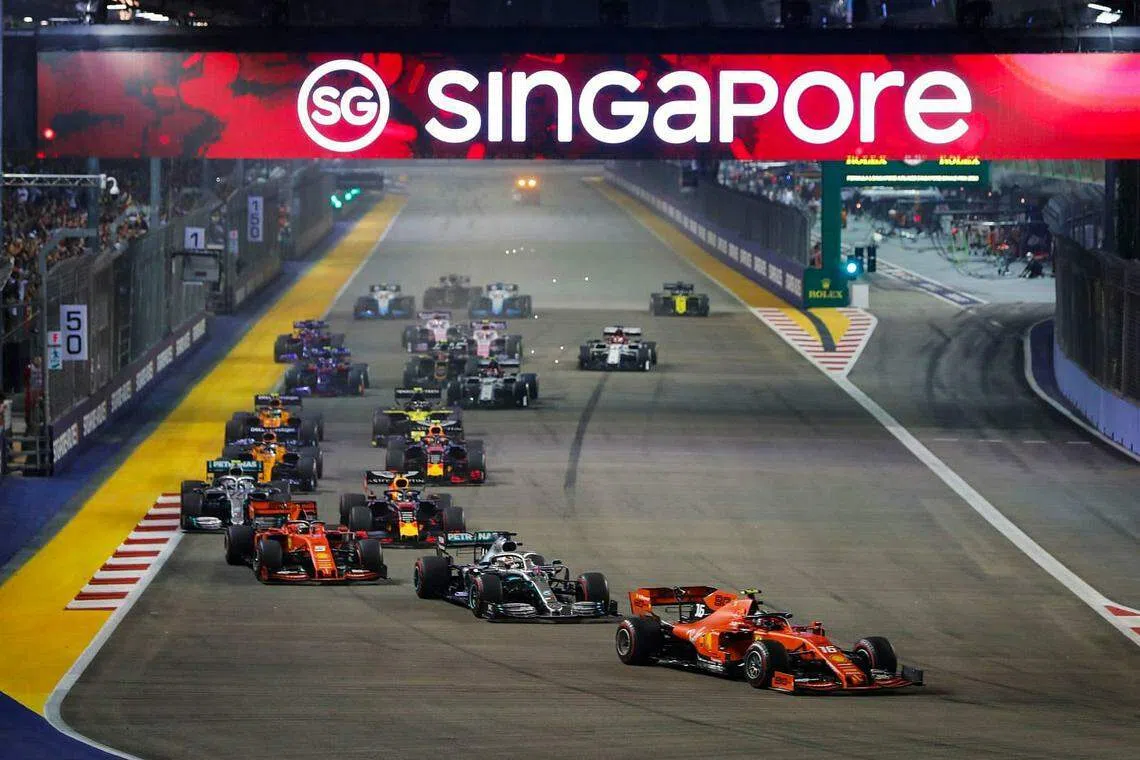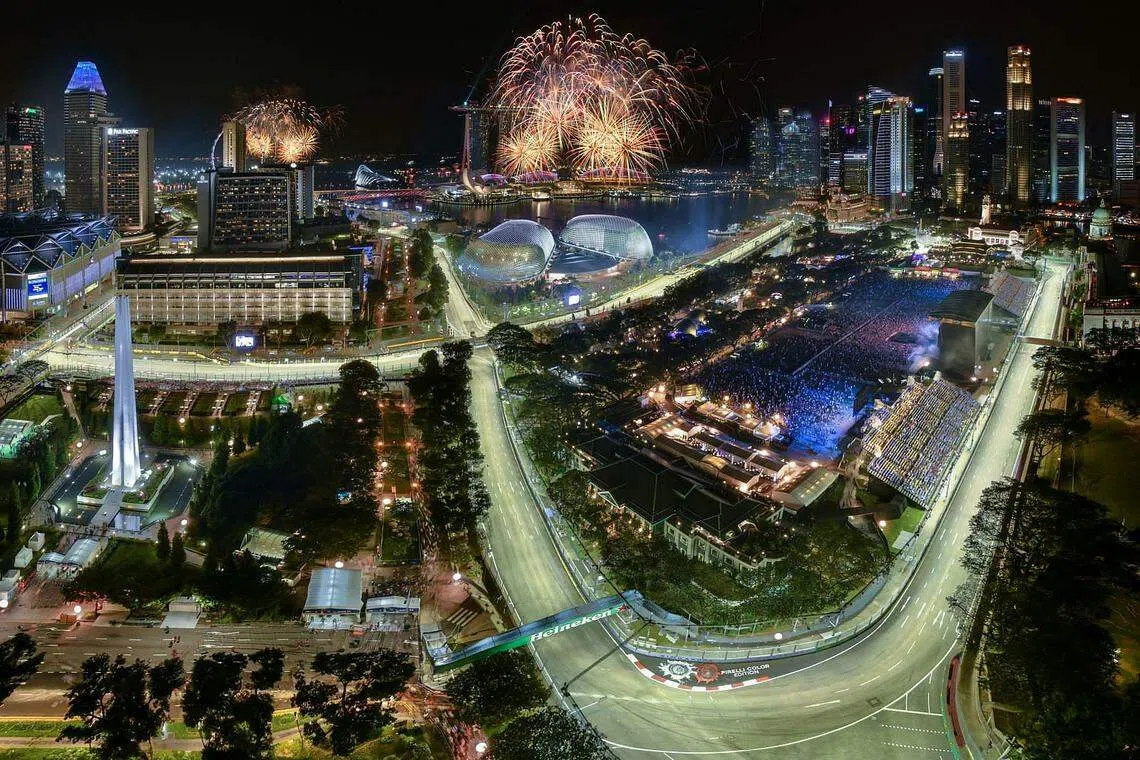Singapore Grand Prix to make a comeback this year; Republic inks 7-year contract

THE Formula 1 Singapore Grand Prix will flag off once again this year and remain a fixture on the calendar until 2028 as the Republic positions itself to ride on an eventual, post-pandemic rebound in tourism.
The Singapore Tourism Board (STB) and race promoter Singapore GP (SGP) announced on Thursday (Jan 27) that a 7-year contract has been inked, with the aim of supporting businesses, creating jobs and getting tourism back on its feet as Singapore commits to re-opening.
However, against the backdrop of the ongoing global pandemic and a fresh wave of Covid cases in Singapore, measures will be put in place to prioritise health and safety. Meanwhile, as both the nation and F1 press ahead with carbon neutrality efforts, STB and SGP will work together to reduce the carbon footprint of the Singapore race, they highlighted.
S Iswaran, Minister for Transport, said: "Even as we deal with the immediate challenges of the pandemic, it is important that we focus on our recovery and long-term growth. The Singapore F1 race continues to be a strong focal point for tourists, global events and business meetings."
He added: "The renewal will help sustain Singapore's reputation as a global city with a vibrant lifestyle, attracting international visitors as travel rebounds, and generating business revenue and jobs for Singaporeans."
It is unclear at this point whether safe-distancing measures would translate to a significant cut in the number of spectators that can attend this year. Another factor that could influence the attendance of tourists might be the availability of vaccinated travel lanes. Some 268,000 spectators attended the last race in 2019, of whom over 40 per cent were from overseas.
Navigate Asia in
a new global order
Get the insights delivered to your inbox.

This year's race (Sep 30-Oct 2) will be the first since 2019 after the pandemic slammed the brakes on the Singapore Grand Prix, leading to the cancellation of the 2020 and 2021 editions. Aside from Singapore, the other host venues in the Asia-Pacific that will be returning to the starting grid this year are Australia and Japan. Shanghai has fallen off the calendar for the third year running as China strives to maintain a zero-Covid policy.
At 7 years, this is the longest contract the Republic - which has hosted the street circuit race since 2008 - has inked to date so as to benefit from pent-up demand as travel slowly recovers. In the past, it signed two 5-year contracts, followed by a 4-year contract which kicked off in 2018 and concluded in 2021. Singapore Airlines' title sponsorship also ended last year.
Border restrictions have kept Singapore's tourism industry in the doldrums, with just 330,000 visitors to the city-state in 2021, while tourism receipts stood at an anaemic S$1.9 billion. In comparison, the Republic received over 19.1 million visitors and raked in tourism receipts of S$27.7 billion prior to the pandemic in 2019.
Noting that F1 is growing in popularity again, James Walton, sports business group leader for Deloitte Southeast Asia, said: "Given that there may be some safe distancing that affects capacity and some challenges to travel, (a seven year contract) gives enough of a runway to really tap into that pent-up demand. Secondly, they want to encourage innovation and create a unique Grand Prix, and a Grand Prix that can align with Singapore's Green Plan and sustainability commitment."
Stefano Domenicali, chief executive of Formula 1, said: "This extension is part of our long-term commitment to continue to grow the sport in Asia."
"The plans that are in place to reduce the carbon footprint of the event are impressive and align with our plans to be net zero carbon as a sport by 2030," he went on to say.

Transporting teams, cars and equipment are a key contributor to the motorsport's carbon footprint - more so than the car emissions. F1 is looking at improving logistics and travel through "process and volume optimisation, and by using the least carbon-intensive transport available".
Analysts also pointed out that another driver of the carbon footprint is international travel, when people fly across the globe to watch F1, so one aspect to look at is how to ensure sustainable tourism.
Race organiser SGP has said that it will adopt green solutions to reduce the carbon footprint of the night race. This will include replacing the existing track lighting with more energy-efficient LED lights; switching to greener electricity sources to power certain amenities within the circuit park; opting for electric and/or hybrid support vehicles for the event where possible; using food digestors at hospitality facilities to convert food waste to organic compost; and reducing the use of single-use plastics and food packaging. A full sustainability audit will be carried out to guide green initiatives that will be rolled out over the seven years.
Cherine Fok, director of sustainability services for KPMG, outlined recommedations that KPMG has made to mitigate the environmental impact of hosting mega events such as the Olympic and Paralympic Games. Drawing from these, Fok suggested that the Singapore Grand Prix organisers could explore avenues such as repurposing and upgrading existing infrastructure, including upgrading existing assets by using recycled materials and lower carbon options.
Held at Marina Bay, the Singapore Grand Prix is unique as it is the only night race on F1's calendar, generating over S$1.5 billion in incremental tourism receipts for Singapore and attracting over 550,000 unique international visitors since its debut.
Race weekend usually gives hotels and other consumer-facing businesses, such as those in food & beverage, a fillip. Meanwhile, 90 per cent of race organisation is sub-contracted each year to Singapore-based firms, including small and medium enterprises. Some 30,000 staff, contractors and stakeholders work at the Marina Bay Street Circuit each race weekend.
Hosting the race has also raised the Republic's profile, with the Singapore skyline beamed to global audiences totalling over 930 million viewers since the inaugural race first flagged off.
The race has costed some S$135 million annually for past editions, with the government funding 60 per cent of the cost, and SGP - backed by hotel tycoon Ong Beng Seng - the remaining 40 per cent.
Hosting fees for the latest contract were not disclosed, although Deloitte's Walton reckons the longer running contract would have put Singapore in a better negotiating position, especially since other Asian countries such as Malaysia and India have slid off the 23-race calendar along the way. "Asia is the most important target market for F1," Walton added.
READ MORE:
- Formula One: Singapore Grand Prix cancelled for second year in a row over Covid-19
- Covid-19 puts the brakes on this year's F1 Singapore Grand Prix
- F1 Singapore Grand Prix draws 268,000 fans, 2nd highest on record
Decoding Asia newsletter: your guide to navigating Asia in a new global order. Sign up here to get Decoding Asia newsletter. Delivered to your inbox. Free.
Copyright SPH Media. All rights reserved.
